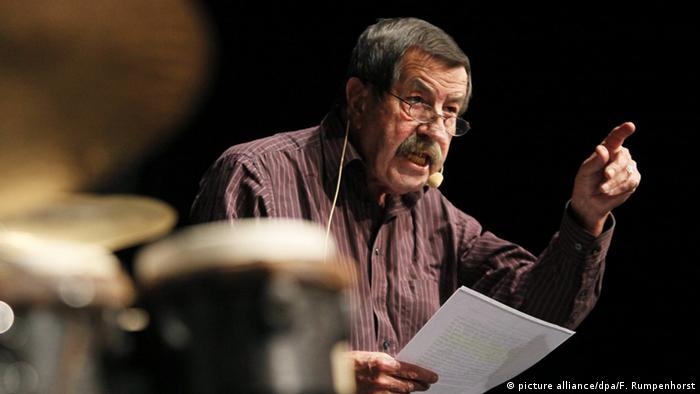LITERATURE
Günter Grass: 'A titan, a giant'
Günter Grass, alongside Heinrich Böll, was a leading icon among Germany's postwar writers. He was popular abroad, too. But Grass' works had even greater aesthetic weight, says literary critic Denis Scheck.
DW: In Germany Günter Grass was seen as a controversial figure rather than a celebrity over the last few years - why is that?
Denis Scheck: Because the number of idiots in Germany hasn't decreased since the state was founded. With people who were more or less rational thinkers and literary critics who chose an aesthetic line of argumentation, Günter Grass was celebrated more than he was a controversial.
On a day like today, we must salute a literary performance of a lifetime that is really only comparable to with that of Thomas Mann in the 20th century. We shouldn't forget this first sentence of the Tin Drum: "Granted: I AM an inmate of a mental hospital; my keeper is watching me, he never lets me out of his sight; there's a peep-hole in the door, and my keeper's eye is the shade of brown that can never see through a blue-eyed type like me." And that it was something like a "big bang" for a truly independent German literature after World War II. Here, a clean sweep was actually made, an aesthetic new beginning that led to an incredible literary flowering and this flowering is bound to the name Günter Grass.
You mention Thomas Mann as a benchmark. Where will Grass rank after Thomas Mann? Does that leave only Heinrich Böll, or not even him?
No, it doesn't leave Heinrich Böll. If you compare the works you'll notice that even the early Böll, who still has greater aesthetic explosive force, can't quite measure up. It's no coincidence that, apart from Celan in poetry, basically Günter Grass is the only German postwar writer left over next to Hermann Hesse, but I wouldn't attribute him to West German literature even though he lived to see it.
The fact is that Günter Grass remained to be the only one and he made a great impression in particular abroad. He influenced many other authors, just think of John Irving or Salman Rushdie.
Günter Grass also liked to meddle. He was a very critical observer of German unity for a long time. Did he ever drop that defensive stance toward a larger, united Germany?
On a political level, Günter Grass certainly felt German unification was by no means a glorious chapter. What we can learn from him is a certain persistence in view of the facts that speak against him but that's an expendable luxury and completely irrelevant for the likes of a writer. It would surely be wrong to measure the likes of Günter Grass in such a manner; in this case, you need an aesthetic benchmark.
Gauged by his poetry and novels, his literary oeuvre, he's a titan, a giant, and any political mistakes are totally irrelevant. What we need to speak about is the Danzig Trilogy, that's his main work, and the Meeting at Telgte - those are the big novels. I would also say that his autobiographic efforts in The Box und Grimm's Words, efforts to talk about himself but also to expel narcissism from the autobiography, in Peeling the Onion the first volume was a memoir, I'd say this autobiographic trilogy was a lovely, productive literary endeavor.
How damaging was his revelation that he served in the Waffen SS for a short time?
That turned into a media campaign. In fact, Grass contemporaries repeatedly pointed out that he already mentioned this in the 1950s and 1960s; he just didn't put it in writing. It was certainly not very wise to include that in his literature so much later. Only people who have learned nothing at all from history, who really believe that little brown-clad men climb out of UFOs, only they now have a totally new picture of von Günter Grass. It's merely a few weeks' membership by a young man not yet 18 years old. I can't imagine that anyone in their right mind would break with Günter Grass just because of that.
What relevance do his writings still have for the younger generation today? Is he merely a German writer of the post-war era and the years of rebuilding the country?
No, not at all. He is a titan of the greatest literary relevance, he is the benchmark. Currently, there is no active German author who compares to his relevance. He was relevant in the 1960s and 1970s but Günter Grass' true merit is that through his works and his commitment, he made the Federal Republic of Germany a more civilized and livable place and for that, we must be thankful.
Denis Scheck, is a German literary critic. The 51-year-old is a literature editor at Germany's Deutschlandfunk national public radio broadcaster, and served as member of the jury for the Ingeborg-Bachmann Award in Klagenfurt from 2000 to 2002. dw de


No comments:
Post a Comment